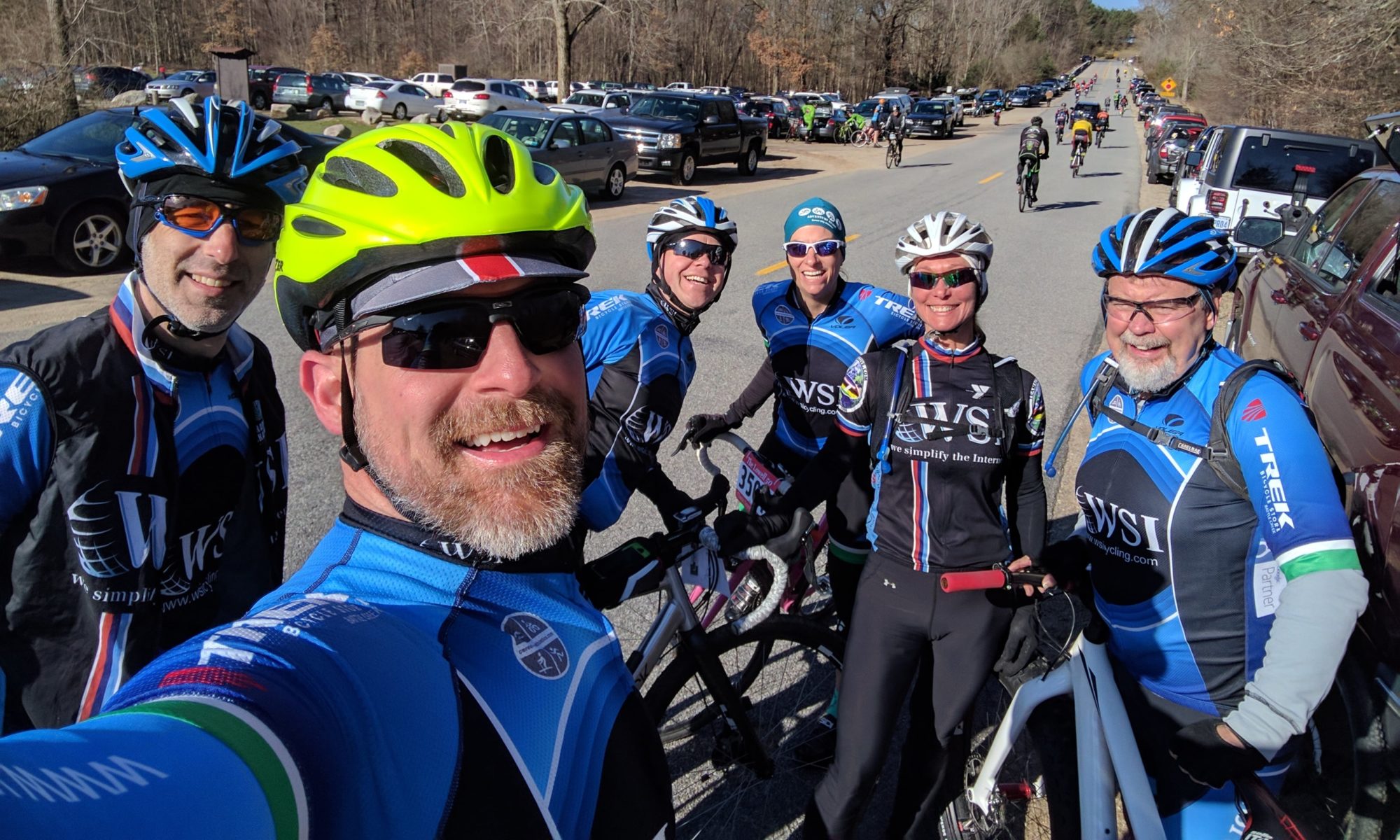Hanson Hills Challenge – June 2nd, 2013 – Grayling, Michigan – Hanson Hills Recreation Area
I put an exclamation mark in the title, because that’s going to be the most exciting thing in this report. By far.
After a hellish and unplanned 14-hour Saturday at work, all I wanted to do on Sunday was race. I had a couple of options: the TK Lawless time trial in Vandalia, Michigan, or the Hanson Hills Challenge XC race in Grayling. I hadn’t ridden either course, but since the Hanson Hills challenge was part of the MMBA championship points series (in which I’m participating), I opted for Hanson Hills.
I left Kalamazoo around 8 a.m. and made the drive to Grayling in 3 hours flat. Soon after arriving at Hanson Hills, I ran into Battle Creek locals Byrne Johnson and Jay Bridgeman (both of Custer Cyclery), and then rode around for a bit of a warm up. Although it had been relatively nice out when I left my house, Grayling was another story altogether – it was somewhere around 40 degrees and incredibly windy. On June 2nd. No one was thrilled about this. After we finished warming up and complaining about the weather, Byrne and I made our way to the start, where our class (sport singlespeeds) were first off the line. Also present was Eric Wolting, who happens to be annoyingly fast; Pam Bufe (the lone female singlespeeder who has been at almost every race in Michigan this year); and a few local gents I didn’t know. The field was about 8 or 9 deep.
Before I get to the race, a few notes on Hanson Hills: having never ridden there, I wasn’t entirely sure what to expect. I read some course descriptions online, which claimed it was “fast and flowy,” and saw some Strava segments which showed about 600 feet of climbing. I don’t entirely agree with the “fast and flowy” description, and here’s why: there are two long climbs (one at the beginning and one towards the end), and there are a TON of short, sharp increases in elevation that completely kill your momentum (mainly during the first 7 miles). The majority of the course is singletrack, and much of the trail itself is rather soft with frequent sections of pothole-like depressions. The singletrack isn’t particularly technical, but it really seems like a nearly endless series of quick climbs and descents, only a few of which were smooth and “flowy” (i.e. possible to carry most of your momentum from the descent up the next climb). Regardless of whether I agree with others’ descriptions, I do believe it’s an excellent and challenging course.
Anyway. Based on what I had read, I decided to keep the 33 x 14 gearing I had used at the Stony Creek Marathon. Again, I was running the heaviest gear of the group (nearly everyone else was running roughly a 2:1 ratio), and I took the holeshot at the start followed immediately by Eric. The very beginning of the course was about a half-mile of two track that led into the long initial climb, and I was the first into the singletrack. After about a mile, I washed out a bit on a sharp uphill turn and Eric went by me. For the next six miles, I kept him about 100 yards ahead of me, but it was clear that the gear I was running was a bit too tall. I was doing fine keeping pace, but a tall gear is basically useless when you’re having to slow down and speed up constantly due to changes in elevation – it’s just harder to get going, and when you do, you’re slowed again by the incline. I think if I would have run something closer to a 34 x 16, it would have been perfect for the course. No matter – around mile 7, my chain started skipping. And then it started locking up. And then it fell off.
I dragged my bike off the side of the trail and, not having any tools on me, just sort of stared at it. One of the links in my chain had bent and popped, and I didn’t have any way to fix it. As I was thinking about how far I’d have to walk back to the parking lot, Byrne stopped and offered me a chain tool and a multitool. The man is a saint. I tried to take the bad link out and shorten my wheelbase using my sliding dropouts to accommodate the shorter chain, but it was too short. I then put the bad link back into the chain, kind of bent it into position (using my man strength while quietly crying) (the part about crying is a lie, possibly), and was able to get going again. However, this repair took me over 20 minutes, and absolutely everyone in the entire sport field had passed me. Since my chain seemed to be working as I didn’t hear/feel any skipping, I thought I’d just finish my two laps and enjoy the ride. No dice. About two miles into my second lap, right after the initial climb, my chain broke again. And this time, it flung quite a bit of itself into the woods somewhere. Since I was behind basically the entire sport field and therefore didn’t have to worry about trail traffic, I just coasted the trail in reverse back to the start.
While I was definitely disappointed, I’m sure worse things have happened in the world. I mean, probably, right? Eric went on to win our class, with a local rider placing 2nd and Byrne placing 3rd. Now to examine my bike to figure out why I keep breaking chains, and to get ready for the State Games time trial in a few weeks.
– Adam Cefai
